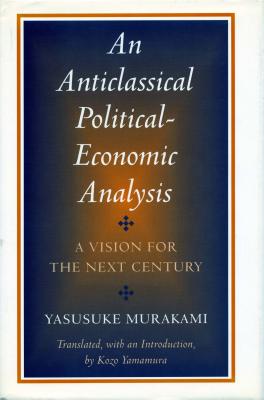Anticlassical Political-Economic Analysis: A Vision for the Next Century

Anticlassical Political-Economic Analysis: A Vision for the Next Century
In his final work, one that distills decades of research and thought, a distinguished economic thinker turned social scientist and philosopher confronts three crucial questions facing the world at the end of the century: How and in what form can a harmonious and stable post-cold war world order be created? How can the world maintain the economic performance necessary for the well-being of people while minimizing international economic conflicts and further deterioration of the world's environment? What must be done to safeguard the freedoms of all peoples? In attempting to answer these questions, Murakami criticizes classical political-economic analysis and offers his own "anticlassical" analyses and visions for the next century. By classical political-economic analysis, Murakami refers to analyses of power politics based on the nation-state system and to classical and neoclassical economic analysis which holds that unimpeded competition and free trade are fundamental bases for increasing wealth for the benefit of all. Murakami's anticlassical stance takes the form of a new, intellectually integrated and reasoned concept called "polymorphic liberalism," which argues that traditional "progressivism"--the belief that humans have an ultimate unique path on which they will reach an ideal social and political-economic system--can no longer meet today's challenges.
In his final work, Murakami confronts three crucial questions: How and in what form can a harmonious and stable post-cold-war world order be created? How can the world maintain the necessary economic performance while minimizing conflicts and environmental deterioration? What must be done to safeguard the freedoms of all peoples?
In his final work, Murakami confronts three crucial questions: How and in what form can a harmonious and stable post-cold-war world order be created? How can the world maintain the necessary economic performance while minimizing conflicts and environmental deterioration? What must be done to safeguard the freedoms of all peoples?
In his final work, Murakami confronts three crucial questions: How and in what form can a harmonious and stable post-cold-war world order be created? How can the world maintain the necessary economic performance while minimizing conflicts and environmental deterioration? What must be done to safeguard the freedoms of all peoples?
In his final work, one that distills decades of research and thought, a distinguished economic thinker tur
PRP: 397.83 Lei
Acesta este Prețul Recomandat de Producător. Prețul de vânzare al produsului este afișat mai jos.
358.05Lei
358.05Lei
397.83 LeiLivrare in 2-4 saptamani
Descrierea produsului
In his final work, one that distills decades of research and thought, a distinguished economic thinker turned social scientist and philosopher confronts three crucial questions facing the world at the end of the century: How and in what form can a harmonious and stable post-cold war world order be created? How can the world maintain the economic performance necessary for the well-being of people while minimizing international economic conflicts and further deterioration of the world's environment? What must be done to safeguard the freedoms of all peoples? In attempting to answer these questions, Murakami criticizes classical political-economic analysis and offers his own "anticlassical" analyses and visions for the next century. By classical political-economic analysis, Murakami refers to analyses of power politics based on the nation-state system and to classical and neoclassical economic analysis which holds that unimpeded competition and free trade are fundamental bases for increasing wealth for the benefit of all. Murakami's anticlassical stance takes the form of a new, intellectually integrated and reasoned concept called "polymorphic liberalism," which argues that traditional "progressivism"--the belief that humans have an ultimate unique path on which they will reach an ideal social and political-economic system--can no longer meet today's challenges.
In his final work, Murakami confronts three crucial questions: How and in what form can a harmonious and stable post-cold-war world order be created? How can the world maintain the necessary economic performance while minimizing conflicts and environmental deterioration? What must be done to safeguard the freedoms of all peoples?
In his final work, Murakami confronts three crucial questions: How and in what form can a harmonious and stable post-cold-war world order be created? How can the world maintain the necessary economic performance while minimizing conflicts and environmental deterioration? What must be done to safeguard the freedoms of all peoples?
In his final work, Murakami confronts three crucial questions: How and in what form can a harmonious and stable post-cold-war world order be created? How can the world maintain the necessary economic performance while minimizing conflicts and environmental deterioration? What must be done to safeguard the freedoms of all peoples?
In his final work, one that distills decades of research and thought, a distinguished economic thinker tur
Detaliile produsului











